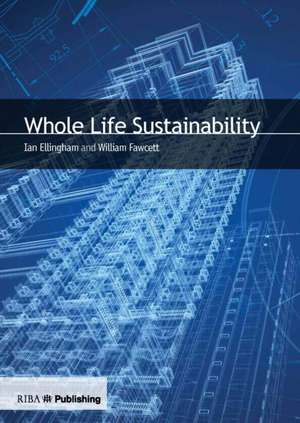Whole Life Sustainability
Autor Ian Ellinghamen Limba Engleză Paperback – 5 apr 2013
For too long WLC has been misunderstood, considered too complicated for designers to undertake on a readily practical basis. But techniques are changing, and Whole Life Sustainability presents a selection of simple analytical tools that architects can use to arm themselves with confident and qualitative justifications for making sustainable decisions.
Increasing numbers of clients are demanding that environmental design is balanced with financial and long-term cost issues, and WLC is a way of finding common currency for making decisions. Whole Life Sustainability shows a number of approaches for doing so, steering clear of number-crunching, and instead using simple 'back-of-the-envelope' techniques, and easy self-assessment tools for the architect to evaluate and understand the whole life of their building.
Whole Life Sustainability is a simple route to more insightful, better-quality analysis in the design process
Preț: 240.74 lei
Preț vechi: 288.63 lei
-17% Nou
Puncte Express: 361
Preț estimativ în valută:
46.06€ • 48.10$ • 38.04£
46.06€ • 48.10$ • 38.04£
Comandă specială
Livrare economică 25 martie-08 aprilie
Doresc să fiu notificat când acest titlu va fi disponibil:
Se trimite...
Preluare comenzi: 021 569.72.76
Specificații
ISBN-13: 9781859464502
ISBN-10: 1859464505
Pagini: 160
Ilustrații: illustrations
Dimensiuni: 175 x 244 x 10 mm
Greutate: 0.43 kg
Ediția:New.
Editura: Riba Publishing
Colecția RIBA Publishing
ISBN-10: 1859464505
Pagini: 160
Ilustrații: illustrations
Dimensiuni: 175 x 244 x 10 mm
Greutate: 0.43 kg
Ediția:New.
Editura: Riba Publishing
Colecția RIBA Publishing
Public țintă
Professional Practice & DevelopmentDescriere
Increasing numbers of clients are demanding that environmental design is balanced with financial and long-term cost issues, and WLC is a way of finding common currency for making decisions. Whole Life Sustainability shows a number of approaches for doing so, steering clear of number-crunching, and instead using simple 'back-of-the-envelope' techniques, and easy self-assessment tools for the architect to evaluate and understand the whole life of their building.
